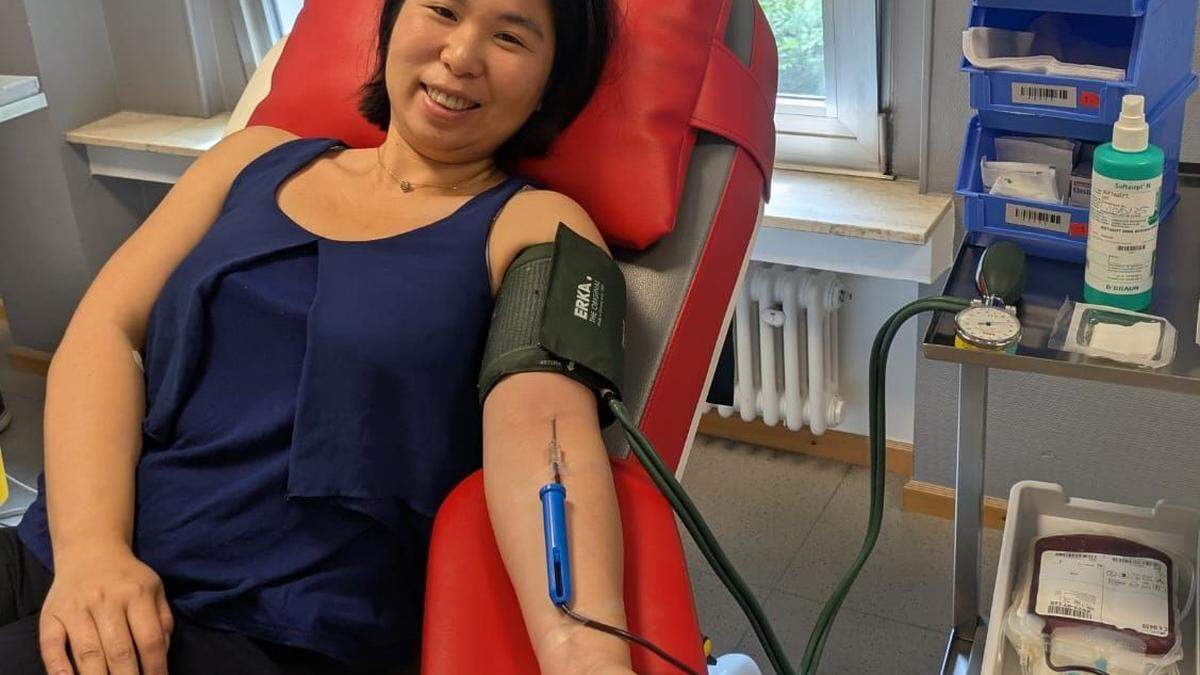Several people donated blood for the first time, as part of a Rotary Club Luxembourg-Kiem initiative, in anticipation of World Blood Donor Day on Saturday 14 June.
Clara Moraru, the Rotary club secretary, had donated blood for many years, then made a break because of extensive travelling, and resumed donating last year, under an initiative started by Dr Hansjörg Reimer, the president of the Rotary Club Luxembourg-Kiem at the time.
This year, she has decided to take a more active role, and appeal through her networks to mobilise some 40 new blood donors.
She highlighted that there is a 70% chance that a person will need at least one blood transfusion during their lifetime, but Luxembourg has only 15,000 regular donors out of some 680,000 inhabitants.
“Science has yet to develop a substitute for human blood, making donor contributions essential, and critical for patients such as those undergoing cancer treatment,” said Moraru.
“To ensure Luxembourg’s self-sufficiency in blood supplies we need to secure 100 to 120 donors a day,” she added.
Several Rotary Clubs organise information stands on donating blood, and there will be two on 14 June – one at Auchan Cloche d’Or and the other at Cactus Ingeldorf. We give details on donating for the first time below.
What did first-time donors think?
Andreea Marin
“I decided to donate blood because I believe that even a small gesture can change lives. My mum was sick for a big part of my life, and I lost her when I was still young. I didn’t have many chances to help her back then — but today, this is my way of giving back. In her memory, I choose to help others,” said Marin.
Andreea Marin chooses to help others © Photo credit: Rotary Club
Pei-Hsuan Lee
“I always believed that donating blood is a wonderful act – not only does it help people in need, but it also stimulates my body to produce new blood more efficiently. It’s my first time donating blood in Luxembourg, but not my first donation.”
I encourage everyone to consider giving this generous gift – you never know whose life you might save
Pei-Hsuan Lee
“I’m grateful to the nurses and doctors who made me feel safe and reassured throughout the process. Donating blood is simple, quick, and truly impactful. I encourage everyone to consider giving this generous gift – you never know whose life you might save.”
Gopi Radhakrishnan
“Back in India, I was a regular donor—every six months without fail. But after moving to Luxembourg two years ago, I somehow lost touch with the habit. This meaningful initiative by the Rotary Club served as a powerful reminder of the importance of giving back to the community in any way we can.”
Gopi Radhakrishnan donated in India and now Luxembourg © Photo credit: Rotary Club
“I’m grateful to my friend and mentor, Clara Moraru, for inspiring me to reconnect with this simple, yet life-saving act. A small gesture from each of us can make a big difference for someone in need.”
Maria Pawelek
“This was my first time donating blood in Luxembourg, but I used to do it regularly in Australia — it’s such a meaningful way to give back and support those in need. I felt a bit nervous at first, but the staff were incredibly kind and reassuring, and there was a lovely sense of camaraderie with the other donors. I’m really glad I did it.”
Maria Pawelek felt a bit nervous but the staff were incredibly kind and reassuring © Photo credit: Rotary Club
Who can donate blood
You must be aged 18 to 60 years (although there may be exceptions), weigh more than 50 kilos (if you weigh less, you may be able to donate plasma), and be in a healthy condition where donating blood will not adversely affect you or the recipient. There are some exclusions such as new mothers or those who have just had a tattoo, but you can take a survey here to find out if you can donate.
How to donate blood for the first time
Appointments can be booked on this website. First, select the location and reason for visit, then indicate that you are a new blood donor.
You will need to bring your ID card or passport plus your social security card or 13-digit identification number (matricule). Registration will require your name, address, and telephone number.
I felt a bit nervous at first, but the staff were incredibly kind and reassuring
Maria Pawelek
Your blood will be analysed to ensure that there will be no potential transmission of virus, bacteria, parasites or antibodies to the recipient, and you will also have an appointment with a doctor to ensure there is no risk to you. If there is a risk, you will be informed confidentially.
You should eat normally (don’t fast) and stay hydrated. On the day of donation, avoid sports before and after and don’t go to a sauna.
Also read:Give the gift of life with blood donations
